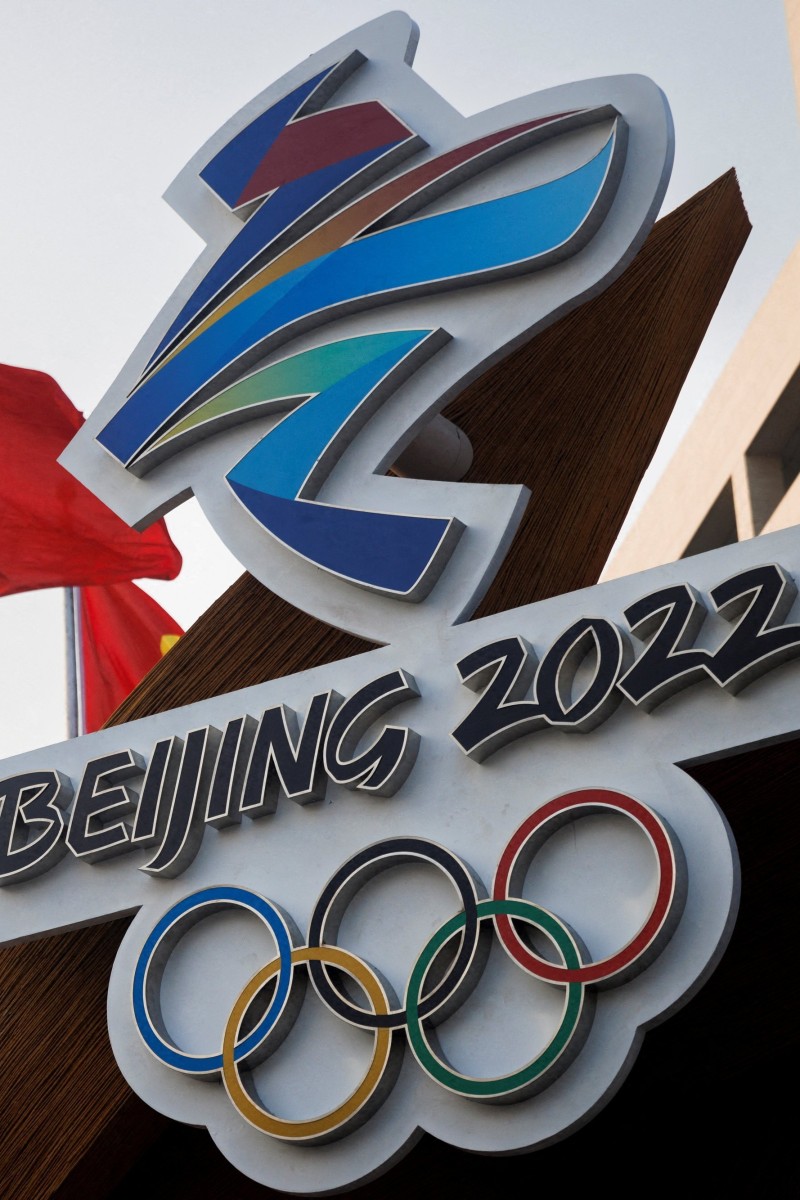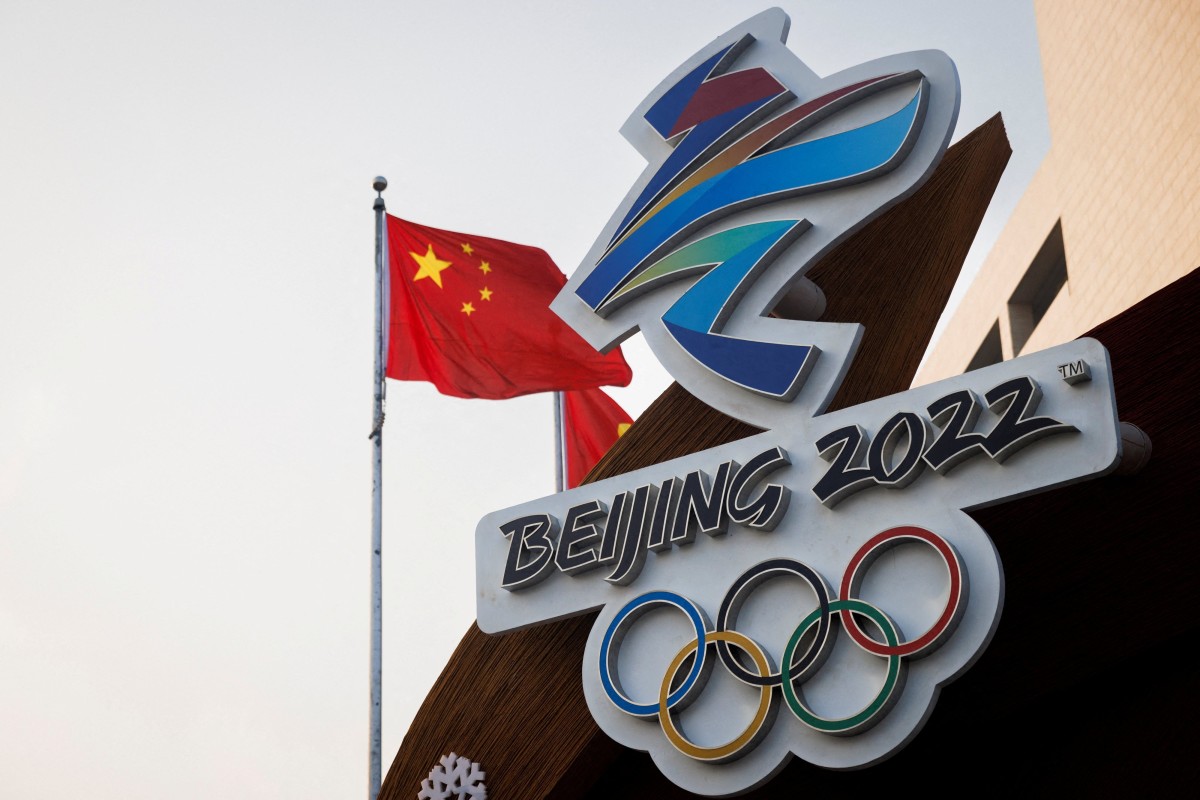
- The Games have begun amid worries that Olympians speaking out on sensitive issues can be penalised despite a 2021 rule change allowing them to express opinions in certain settings
- Meanwhile, some dissidents and academics in China say their WeChat accounts have been restricted in some form in the lead-up to the Winter Games
 Human rights activists have warned participants against speaking out on sensitive issues to ensure their safety during the 2022 Beijing Winter Olympics. Photo: Reuters
Human rights activists have warned participants against speaking out on sensitive issues to ensure their safety during the 2022 Beijing Winter Olympics. Photo: ReutersHot Topics takes an issue that’s being discussed in the news and allows you to compare and analyse different news articles and viewpoints on the subject. Our questions encourage you to examine the topic in-depth and can be used on your own, or with a friend.
Context: Athletes who speak out on sensitive issues during Winter Olympics may be punished
China said last month that it may punish athletes whose words and actions go against Chinese laws at the Beijing Winter Olympics.
“Any expression that is in line with the Olympic spirit, I’m sure will be protected. Any behaviour or speeches that are against the Olympic spirit, and especially against Chinese laws and regulations are also subjected to certain punishment,” Yang Shu, the deputy director general of the international relations department of the Beijing organising committee, said at an online briefing for the Beijing Games.
Hot Topics: Troubles at the Beijing Olympics
Yang said the International Olympic Committee (IOC) also had penalties for violations of rule 50 of the Olympic Charter, which bans any kind of “demonstration or political, religious or racial propaganda” during the Games.
Yang declined to say if there was a maximum punishment for athletes whose political expressions go against Chinese laws or Article 50 of the Olympic Charter. Instead, he referred to the IOC guidelines for the Games.
At last summer’s 2020 Tokyo Games, US shot putter Raven Saunders protested on the podium after winning silver by raising her arms in an “X” gesture to symbolise oppression. Team USA later found Saunders had not broken any rules, while the IOC paused its investigation after her mother died suddenly soon after the event.
China has faced international criticism for its alleged oppression of Uygur Muslims in Xinjiang, where human rights groups and a United Nations committee say that as many as one million are detained in “re-education centres”. The US and Canada have labelled China’s policies in Xinjiang as “genocide” and are among countries that have launched diplomatic boycotts of the Games.
China has repeatedly denied these allegations. Jing Quan, the third-ranking diplomat at China’s Washington embassy, objected to the “genocide” narrative at the briefing and added that sport should not be politicised.
Staff writers
Question prompts:
-
Do athletes have a duty to raise awareness on political and social issues? Explain.
-
Identify ONE example of a “sensitive issue” mentioned in Context. Explain why China might be concerned about athletes expressing their opinions about it during the Games.
Explainer: Why do people want to boycott the 2022 Beijing Winter Olympics?
Cartoon
-
In the cartoon, what do you notice about the artist’s depiction of those in the spectators’ seats?
-
Based on Context and News, explain what this cartoon might be suggesting about the stance China and the IOC have taken on political expression at the Winter Olympics.
News: US lawmakers demand IOC reaffirm athletes’ free-speech rights
US lawmakers have called on the International Olympic Committee (IOC) to reaffirm the free-speech rights of athletes in the Winter Games, after warnings that speech that violated Chinese regulations would be punished.
“The International Olympic Committee – and its president Thomas Bach – must immediately clarify that free speech by athletes is absolutely guaranteed at the Olympics,” a bipartisan group of eight congressional representatives wrote last month.
This came a day after Yang Shu, the deputy director general of the Beijing organising committee, said that any behaviour or remarks against the Olympic spirit or Chinese laws were subject to punishment.
In the statement, the legislators said Yang’s words contradicted pledges the IOC had made in an October meeting when its representatives “provided explicit assurances of their commitment to protect athletes if they are prevented from speaking out freely on human rights during the Beijing [Games]”.
The IOC has long prohibited political protest by athletes at the Games including on the field of play and during medal ceremonies – such as in the instance of Raven Saunders’ “X” gesture at the Tokyo Olympics.
But last year, the committee amended its rules to permit participants to express their views on the field before the start of events, in engagements with the press, and on social media.
The lawmakers said those freedoms should allow athletes to speak out on sensitive issues, including the mainland Chinese government’s treatment of Uygurs in Xinjiang and its actions in Hong Kong.
From Peng Shuai to Xinjiang – the issues dogging the Beijing Olympics
“Given the latest troubling comments by the Beijing Organising Committee, we call on the IOC to issue a public reaffirmation of its commitment to protect free speech during the Games, and to clarify what actions it will take to protect athletes if the organising committee or local authorities try to silence them,” they said.
An IOC representative did not answer specific questions about whether it would take steps to protect the ability of athletes to speak out while in Beijing.
“We refer you to the IOC’s Rule 50.2 guidelines,” the representative said, referring to the committee’s rule on athlete expression updated last year.
Staff writer
Question prompts:
-
What forms of athlete expression are permitted under the IOC’s updated rules? How does this compare with what Yang Shu said in Context?
-
Rob Koehler, director general of advocacy group Global Athlete, said: “The IOC has not come out proactively to indicate ... [they] will protect and make sure everyone is safe. Silence is complicity.” Explain what Koehler’s words might mean using News and Context.
Face Off: Should the Beijing Winter Olympics go ahead amid coronavirus concerns?
Issue: China restricts activists’ social media ahead of Beijing Games
Some human rights activists and academics in China have recently had their WeChat messaging app accounts restricted, multiple people affected said, as Beijing cracks down on dissent before the 2022 Winter Olympics.
Eight individuals have reported that their WeChat accounts have been restricted in some form since early December, with some unable to use their accounts entirely and forced to re-register.
“I know many people who’ve been banned from posting in group chats or posting WeChat Moments lately,” a Beijing lawyer whose account was restricted last month said on condition of anonymity.
Beijing-based writer Zhang Yihe said her WeChat group chat and Moments functions – similar to Facebook’s Wall or Instagram Stories – were restricted on January 8.
“Isn’t this equal to removing an individual from a public space?” said Zhang, adding she can now only send WeChat messages to individual users.
Tsinghua University sociology professor Guo Yuhua confirmed her account was permanently blocked the same day, while prominent legal scholar He Weifang said he encountered the same on January 9.
“This storm of shuttering WeChat accounts is ... unprecedented,” said veteran journalist Gao Yu, whose account had features such as group chat messaging permanently disabled for the first time on December 20.
Hot topics: China’s crackdown on entertainment industry
China routinely suppresses the social media accounts and physical movements of dissidents during politically sensitive periods such as Communist Party gatherings in Beijing or key anniversaries such as the 1989 Tiananmen crackdown. The arrival of the Winter Olympics has presaged a clampdown similar to those surrounding other major events.
“The government now wants to make sure that people don’t cross the line online to poke the facade of a perfect Winter Olympic Games,” said Yaqiu Wang, senior China researcher at Human Rights Watch.
The IOC said in an emailed response that it “has neither the mandate nor the capability to change the laws or the political system of a sovereign country”, adding that it “must remain neutral on all global political issues”.
Separately, Beijing Games organisers said they “oppose the politicisation of sport” and were “not aware of these matters”.
Agence France-Presse
Question prompts:
-
Why might China want to suppress the WeChat accounts of activists and academics right before the Beijing Winter Olympics?
-
Context, News and Issue describe limits on freedom of expression at the Winter Olympics. To what extent is this effective in preventing the politicisation of sport, and why? Explain using all three articles and your own knowledge.
Beijing seals off Olympic ‘bubble’ ahead of the Winter Games
Glossary
-
Beijing Winter Olympics: officially called the XXIV Olympic Winter Games. The multi-sport event takes place in China from February 4 to 20 with close to 3,000 athletes competing in 109 different events. The events are held in Beijing and venues near the neighbouring towns of Yanqing and Chongli.
-
Human rights activists: those engaged in campaigns against the violations of universal standards that protect people from severe political, legal and social abuses. Examples of human rights include the right to education, freedom of speech, and a fair trial when charged with a crime.
-
International Olympic Committee (IOC): the non-governmental sports group responsible for supervising and supporting the organisation of the Olympic Games and ensuring that the rules of the Olympic Charter are respected
-
Rule 50 of the Olympic Charter: provides a framework to protect the neutrality of sport and the Olympic Games. It states, “No kind of demonstration or political, religious or racial propaganda is permitted in any Olympic sites, venues or other areas.” The rule was updated in April 2021 (Rule 50.2) allowing athletes to express their views in media gatherings, press conferences, and mixed-zone interviews, as well as on social media.
-
WeChat: a popular messaging app in China with more than 1.2 billion users. Its functions include text and voice messaging, video calls, and a feature called “Moments” in which users can upload images or videos for friends to respond to.
